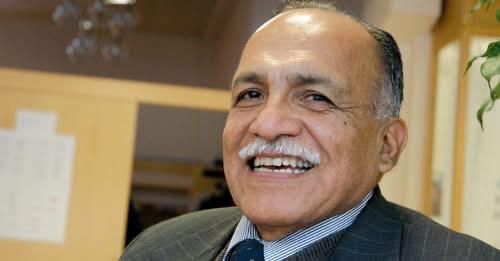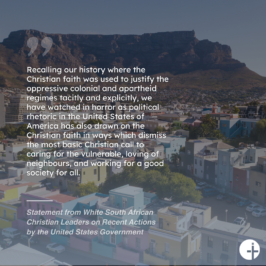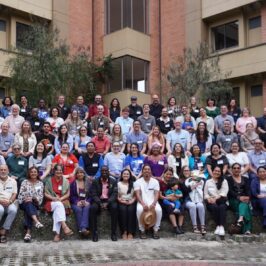Published by Missio Alliance
Written by Ruth Padilla DeBorst
Trade is going strong. And it is horrendously shameful and painful. Because what is being exchanged across the US border is not really a whatbut a who. Many, many “whos.”
17 years ago, two savage earthquakes ripped open the land of the small country El Salvador. More than 1,200 people were killed. A million and a half were displaced. Many of them ended up in the US, joining the thousands of unrecognized refugees of the proxy war fought on Salvadoran land by Cold War factions in the 1980s. Socially excluded young people, fending for their lives in inner-city Los Angeles, gathered in violent gangs, which reached into the Salvadoran neighborhoods when those rejected young people were deported to a country they had never known, a country that was unprepared to receive them. Excluded again, with no prospects of work in a country in which the number one source of income is the remittance sent from abroad by family members, these gangs live off crime and extortion, holding entire neighborhoods hostage.
With more than 60 murders per 100,000 inhabitants in 2017, El Salvador has one of the highest murder rates in the world.[1]
Only such levels of violence can explain facts like this: In 2016 alone, 17,512 unaccompanied Salvadoran children were apprehended at the US border as they traveled alone to the US.[2] What would make a mother or father hide their child behind boxes of fruit and ship them off to the unknown if not the conviction that that destiny was safer than the one they risked at home, where they could be inducted by force into the gangs, raped, or killed? Meanwhile, from January to September 2015, the US and Mexico deported more than 34,575 Salvadoran migrants.[3]
The painful circle continues: violence and lack of opportunity force thousands north, while US foreign policy rejects thousands.
Earlier this year, the Trump administration announced the cancellation of the temporary status granted some 200,000 Salvadorans to live and work in the US—a decision which will only exacerbate the already tragic cycle of death.
Then in April, this same administration enacted a policy that separated 1,995 children from their parents in just six weeks.
[Read All Our Children: How Churches Can Respond to the Crisis at the Border]
What is being exchanged across the US border is not really a what but a who. Many, many ‘whos.’
This surface portrait of the plight of one particular group—El Salvadorans—is but a sample of the reality experienced by immigrants and refugees from pained places the world round.
In most cases, the United States has had a significant hand in producing the conditions that have forced people to move.
What, when confronted by this complex reality, is the role of people living in the United States today, particularly of those who claim to follow Jesus?
I propose that the first step is to ask God’s Spirit to grant us a new set of eyes to see immigrants and refugees in a new light.
A Look at Jesus Is a Good Starting Point
Jesus, the utmost Lord over all creation, left behind his place of honor, and moved into the human neighborhood (John 1:14). From his very conception, he was a person on the move. While still in his mother’s womb, he was carried on a three-to-five-day journey to visit his aunt Elizabeth and back. He was born in a town 70 miles from his parents’ home—about a week’s journey in those days—and then smuggled as a refugee into Egypt. When the threat of murder was over, the family returned, and Jesus was brought up as Jewish Palestinian in Nazareth, a borderland town just four miles from the Greek city of Sephoris, and marked by its influence.
Once he began his public ministry as an itinerant and homeless teacher, preacher, and healer, Jesus appears to have focused mostly on his fellow Jews. But a deeper reading reveals a subversive sensitivity and attention toward uprooted people on the margins, people devoid of home. Lepers ostracized from broader society. Women rejected through divorce, running from town to town to escape stoning. Socially excluded tax collectors. Samaritans, people relocated by force. Crowds of hungry people, displaced by the expropriation and taxation of imperial Rome. And even Roman soldiers, forced far from family as pawns of imperial expansion.
They are not only recipients of God’s favor, though. Jesus’ salvation also recruits them as active agents of God’s purposes. Striking is the fact that Jesus doesn’t just heal, feed, teach, and accompany these people on the move—they are restored to full protagonism as expressions of God’s love in God’s world. For example, Jesus frees the homeless Gadarene who lives among the tombs from the bad spirits that imprison him, and then he becomes “the first gentile missionary to the Gentiles, commissioned by Christ himself.”[4] Over the following decades, it was Christians on the run, the persecuted diaspora, who spread the Good News to the most remote corners of the Roman empire. Jesus saw, loved, and recruited foreigners, outsiders, people on the move, and he confronted all prejudices, practices, and powers that did not allow them a fair place at the table.
Do Like Jesus: See, Love, Recruit, and Confront
Jesus sees. Those of us who have jobs, education, credit cards, health insurance, official IDs—the passports of plenty granted by our consumer society—are often blinded by our security, our power, and our material comfort. We live as if everyone were like us and had the means and freedom to come and go, to make choices, explore their vocation, and make a living. Blind we are.
Jesus loves. We, like Nathanael when hearing about Jesus, are often quick to operate out of our prejudices.[5] Can anything good come out of Nazareth? Or from across the Southern border of the US? From the countryside into my sophisticated city? From a brothel or a brick kiln? We hang out with people like us in safe places and perhaps donate to some worthy cause. We may even take a step further and join advocacy groups or campaign against poverty or human trafficking. But love does not reach from afar: it demands incarnation, moving into the neighborhood. And, as with the unlikely Messiah from Nazareth, love demands death. Death to self. Death to the mirage of a success-society built upon injustice and abuse of creation.
Love does not reach from afar: it demands incarnation, moving into the neighborhood.
Jesus recruits. Yes, we are sent like Jesus into the world to teach, to preach, to heal, to aid those in need, to rescue the oppressed, and to release the suffering. We are to recruit people on the move. But our illusions of power and self-sufficient superiority often make us look down condescendingly on refugees, migrants, and immigrants as mere charity cases that allow us the chance to rack up brownie points on a compassion scale. Yet no! We are called to recognize Christ in their faces; to marvel at the gifts, insights, and strengths God has granted them; to learn from their resilience and courage; and to walk alongside them in mutual accountability, discipleship, and community. A much-needed reformation in European and North American Christendom is actually being led by Christian immigrants—tent-making, lay missionaries from Southern Asia, Africa, and Latin America. Immigrants are playing valuable mediating roles between cultures and religions and, far from de-Christianizing the United States, Christian immigrants are reforming US Christianity by de-Europeanizing it.[6]
Jesus confronts. Jesus denounces attitudes and practices that deny people their rightful place in the community. Messy and controversial as it may currently be, Jesus’ followers likewise must dig under the political publicity and popular hype and ask hard questions. What economic and political interests are being fed on the hunger of the poor and forcing people to wander? Can we really just sit by while today’s economic globalization, accompanied by the individualistic and materialistic culture of its (mostly) Western proponents, is threatening the relational and creational capacity of people, undermining community life, and plundering the environment the globe over? If we believe that in Christ there is no Greek or Jew, can we allow our core identity to be determined by the circumstantial constraints of any one humanly devised and militarily expanded nation state and so feel entitled to class some as outsiders and exclude them—often from the very land their ancestors named, like California, Texas, Colorado, Nevada, Arizona?
Until our own pilgrimage is over, and we arrive in our final home, we are sent to move, with Christ, into his neighborhoods—the ghetto and the gated community, the hood and the high-rise, the barrios and the ‘burbs, with this prayer in our hearts:
Community-of-Love, by your grace you have made us members of your transnational family, which transcends geographical, historical, cultural, racial and gender barriers. Give us eyes to recognize Jesus in our neighbors and grant us courage to live as expressions of a Kingdom that is not of this world yet has already broken into it, as reconcilers, border-crossers, border-benders, border-breakers.
[1] Héctor Lindo-Fuentes, a Salvadoran historian at Fordham University in New York, cited by Gene Palumbo and Azam Ahmed Jan 9, 2018, https://www.nytimes.com/2018/01/09/world/americas/el-salvador-trump.html
[2] Gene Palumbo and Azam Ahmed, “El Salvador Again Feels the Hand of Washington Shaping Its Fate,” The New York Times, Jan 9, 2018, https://www.nytimes.com/2018/01/09/world/americas/el-salvador-trump.html.
[3] https://www.telesurtv.net/english/news/El-Salvador-Voices-Concern-Over-US-Mass-Deportation-Plan-20160105-0032.html
[4] Christopher Wright, The Mission of God: Unlocking the Bible’s Grand Narrative, Downers Grove: InterVarsity Press, 2006, p 508.
[5] John 1.43-51.
[6] Stephen Warner, “Immigrants and the Faith They Bring,” Christian Century, February 10, 2004, pp. 20–23. Accessed from Religion Online on July 20, 2017 http://www.religion-online.org/showarticle.asp?title=2946.






